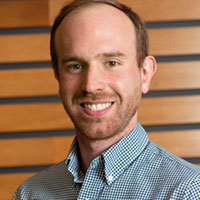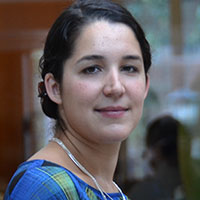200,000 North Carolinians are in the 'Medicaid gap.' What does that mean?
November 18, 2019
North Carolinians who fall in the “Medicaid gap” are less likely to regularly use preventive care and more likely to put off needed care due to cost, finds a new study from the UNC Gillings School of Global Public Health.
North Carolina is one of several states that has not expanded Medicaid eligibility to cover all low-income adults, and it’s estimated that there are about 200,000 North Carolinians in the “Medicaid gap.” Their income is below the poverty limit — making them ineligible for premium subsidies through the health insurance marketplace (which are offered to people whose incomes are between 100 and 400 percent of the Federal Poverty Level) — but they cannot access Medicaid, either.

Alex Gertner

Dr. Jennifer Spencer
Jennifer Spencer, PhD, a recent UNC Gillings graduate who is now a postdoctoral fellow at the Dana Farber/Harvard Cancer Center, and Alex Gertner, a doctoral candidate earning a dual degree in medicine and health policy and management, worked with Pam Silberman, JD, DrPH, professor of health policy and management, to examine the health status and access to care of North Carolinians who would receive Medicaid if North Carolina expanded the program. Their study was published online by the North Carolina Medical Journal.
In addition to being less likely to use preventive care and more likely to put off needed care due to cost, those in the Medicaid gap are less likely to have complex health problems than traditional Medicaid beneficiaries, the study revealed.
“The Medicaid gap population is not well understood in North Carolina, and the differences between the traditional Medicaid population and the Medicaid gap population is really striking,” says Spencer, the lead author of the study. “Particularly, the finding that this population is less likely to have complex health needs may lessen some of the worries that expanding Medicaid for this population would be a burden on our health care system. A lot of what we find is individuals with poor access to primary and preventive care, which is a problem expansion could address.”
Using annual risk factor survey data, the researchers classified respondents who were uninsured and earning below 100 percent of the federal poverty guidelines (FPG) as falling within the Medicaid gap. Then, they analyzed health care access, receipt of preventive care and current health status of the gap population compared to insured populations below FPG (representing the traditional Medicaid population), and to individuals above the FPG regardless of insurance status.
They found that, compared to Medicaid beneficiaries and people above FPG, North Carolinians in the Medicaid gap are three times as likely to have no regular source of health care and twice as likely to report a delay needed care due to cost, as well as 1.5 times more likely to have stopped taking a medication due to price. They’re also much less likely to have seen a dentist in the past year, to have had a Pap smear and to have gotten a flu vaccine.
“Our study shows that North Carolinians in the Medicaid gap are struggling to afford health care, including low-cost care that could prevent future serious illnesses,” Gertner says. “Failing to connect these individuals to care today could mean greater health care costs and higher disability rates for North Carolina tomorrow.”
Spencer adds that the debate about whether to expand Medicaid comes at a time when North Carolina’s Medicaid program is using its Section 1115 waiver to test out potentially innovative new programs to improve Medicaid health outcomes.
“I think a lot of advocates are really hopeful that, as we think about how to expand the healthy opportunities for those who have Medicaid right now, the state will also think about the 200,000 North Carolinians who are falling into this gap and missing out on some important opportunities for health,” she says.
Contact the Gillings School of Global Public Health communications team at sphcomm@unc.edu.
